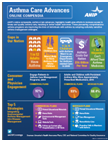Asthma Care Advances
One in twelve Americans in the U.S. has asthma. Asthma disproportionately affects children, females, racial and ethnic groups, and low-income individuals. Asthma, a common chronic condition, costs our nation $56 billion per year.1. Research has shown the environmental impact of asthma and poor outcomes based on where one lives, learns, works and plays.
AHIP’s member companies have pioneered multiple strategies and programs to help consumers take actionable steps to control their asthma through education and environmental control; foster collaboration with community agents to deliver community-based care; and facilitate patient-centered care through measurement, monitoring, and promotion of evidence-based guidelines among physicians and asthma care managers. Such targeted outreach and environmental interventions have resulted in individualized and family-centered care, a reduction of emergency room visits and inpatient hospitalizations, and overall improvements in care.
In alignment with Coordinated Federal Action Plan to Reduce Racial and Ethnic Asthma Disparities and the National Institutes of Health’s EPR-3 guidelines, the plans highlighted in our Asthma Care Advances compendia are improving the lives of individuals with asthma by adopting culturally-sensitive comprehensive asthma management strategies.
 Asthma Care Advances Infographic
Asthma Care Advances Infographic
Highlights
the asthma impact and gaps in our nation, health plans’ consumer and physician
engagement in asthma care management and medications, and the top five
strategies commercial and Medicaid plans use to integrate environmental asthma
management into disease management programs.
Plans and Programs:
Aetna
Helping People “Breathe Easier:” Aetna’s Asthma Program for Medicaid Members in Delaware
Aetna developed a culturally appropriate, evidence-based asthma program targeting high-risk populations. The goal was to impact ER asthma utilization by improving the quality of asthma care for this population while simultaneously reducing avoidable ER visits in a specific state or region.
AmeriHealth Mercy Family of Companies
Healthy Hoops® - Fulfilling the Promise of Health
Healthy Hoops® focuses on two critical childhood health conditions: asthma and obesity. Healthy Hoops is an NCQA accredited program and is a trademarked outreach program of AmeriHealth Mercy Family of Companies.
Capital District Physician's Health Plan (CDPHP)
Asthma Care Management Program
CDPHP has developed a number of strategies to remove identified barriers related to knowledge and cost, and to ensure quality asthma care is delivered to their diverse members.
Cigna, Inc.
Chronic Condition Coaching: Asthma
Cigna's innovative Your Health FirstSM solution takes a holistic approach to helping individuals manage asthma and other chronic health conditions.
EmblemHealth
Asthma Project
EmblemHealth developed an asthma care management program to increase compliance among members, 5-50 years of age, in their use of controller medications for the treatment of persistent asthma.
Humana, Inc.
Disparities of Care in Asthma: Humana’s Solution
Humana’s cultural diversity program seeks to identify disparities among members, target interventions to address disparities, and meet the needs of vulnerable populations with culturally and linguistically appropriate services.
Kaiser Permanente
The Colorado Asthma Experience
Kaiser Permanente Colorado’s Asthma Management
Disease Program, led by RNs known as Asthma/COPD Care Coordinators (ACCs), work
closely with primary care physicians on outreach and education resulting in
increased medication management.
Neighborhood Health Plan
Asthma Disease Management Program
NHP’s Asthma Disease Management Program (ADMP) focuses on reaching out to members at risk and engaging their providers with actionable, patient-specific data to improve outcomes related to appropriate medication use and reducing hospital-based utilization.